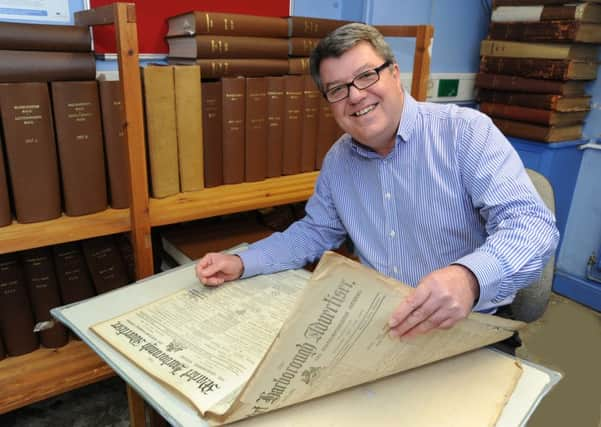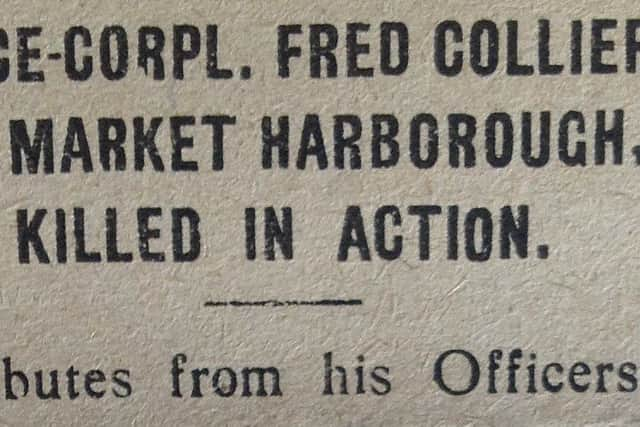JOHN DILLEY'S WWI BLOG: There one minute - and vaporised the next


Fred Collier was four days past his 28th birthday when he got up in his frontline dugout on the morning of February 25, 1917.
He had left his job at Messrs R and W H Symington to join the Harborough Territorials right at the beginning of the war and had enjoyed just one Blighty leave in all that time.
Advertisement
Hide AdAdvertisement
Hide AdAll that active service at the Western Front must have made Lance-Corporal Collier feel pretty lucky. But at 9am on that fateful day his luck came to an end.


Readers of the of March 13, 1917, edition of the Market Harborough Advertiser, are told his story, presumably via Fred’s wife, who has brought letters received from fellow soldiers into the editor.
“He was killed instantaneously by a German shell which exploded in his dug-out,” says a letter from Fred’s commanding officer.
Thirteen unlucky words that sum up the fickleness of his type of warfare. One minute worrying about everyday issues of warmth or food – the next moment gone; completely gone.
Advertisement
Hide AdAdvertisement
Hide AdFor that is how Fred – and many more like him – would have died. Vaporised in the blink of an eye.


Eighteen months earlier the Advertiser would catalogue descriptions of searches for soldiers who literally vanished after a direct hit from a shell: “one minute he was there and the next there was nothing but traces of blood and mush.”
However, by this point in the war there is no need for the editor to write about the futile investigations for any remains of Fred, it is time only for comforting words about the man who ‘did his duty gallantly and died for his country’.
The commanding officer continues in his letter to Fred’s wife: “You have the one great consolation in knowing that he died fighting for his country, and for you, who he loved, no man tried to do his bit and hold his corner more than your husband, he was a fine soldier.”
Advertisement
Hide AdAdvertisement
Hide AdThere is more news from the Front in the shape of Lieutenant Hubert Baxter of the Monmouth Regiment, who used to work at Barclay’s Bank in Market Harborough.
Readers are not only told that he ‘was badly wounded in action on March 3 rd ’ but that his parents have also been informed ‘that his right leg has been amputated’.
The news is a brutal reminder of the consequences of injury: this is a man who will come back to England and be disabled for the rest of his life.
How do all the young men deal with the fear of being vaporised or disabled? Perhaps there is a clue in a poem entitled Jack, of the Second Fifth, published on page 6 of the Advertiser, written by Kibworth man A J Freeland.
It is mud all day, and it’s mud all night
If the mud ain’t blanky froze,
Then you hear a shout from the next dug-out,
“What price for your bloomin’ toes?”
And you chip right in with a raucous laugh,
That ‘trotters are off today,
If you want a treat you can have my feet,
Free gratis and nothing to pay.”
Advertisement
Hide AdAdvertisement
Hide AdThe poetry is not Owen or Sassoon, but jaunty humour over-riding the stiff upper lip of the British ‘can-do attitude’ is evident in every rhyme: you can almost picture the cheeky Tommy, tin hat askew, fag hanging from the corner of his mouth, cheerily brushing aside the terrible conditions and the fear of consequences.
The poem of course ends on an optimistic note:
You will stick it Jack, till the cows come home,
Which I trust, lad won’t be long.
After more than two appalling years of conflict, the only message for the soldiers and their loved ones is simple: hope.
*This column is published every Monday by John Dilley on the Newspapers and the Great War website and will continue until the 100 th anniversary of the final armistice in November 2018.
*John’s fellow researcher and De Montfort University lecturer David Penman is conducting a similar real-time project with the Ashbourne Telegraph. Check out his Great War Reports.